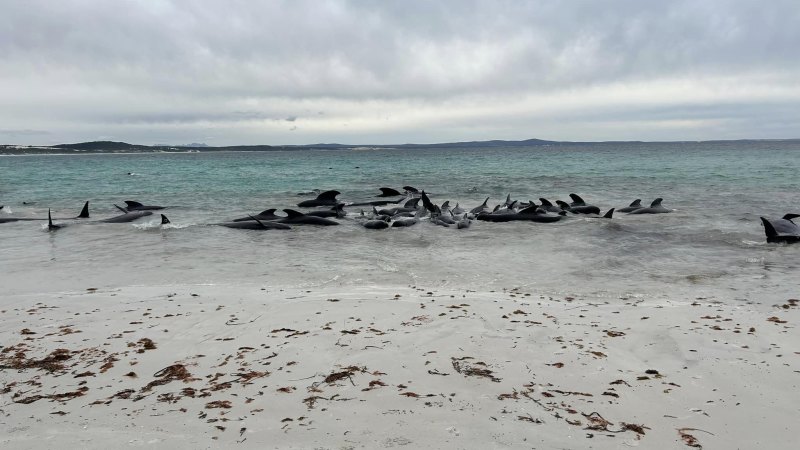Save articles for later
Add articles to your saved list and come back to them any time.
Rescuers plan to release the whales who have so far survived a mass beaching in Western Australia together as a pod once they have had a chance to rest.
More than half of the 97 pilot whales that beached themselves off the southern coast of Western Australia on Tuesday afternoon have died, but rescuers are optimistic they can save the remaining whales. Volunteers are in the water supporting their bodies and giving them a chance to recover.
Incident controller Peter Hartley said he was holding on to hope.
“Once they have all recovered and we believe they are strong enough we will then release them as a pod,” he said.
“We have volunteers coming with kayaks later on, to try and gently herd them out of the bay … and into deeper water.”
He said volunteers had to be optimistic.
“It is highly stressful for all the people here and you have to have something to hold on to,” he said.
“A big shout-out to all the volunteers that have turned up, they have been outstanding and really complementing the rescue effort.”
The pod was initially filmed floating in an unusual cluster about 150 metres off Cheynes Beach in Albany before the whales started becoming stranded around 4pm.
Dr Joshua Smith, marine biologist and Senior Research Fellow at Murdoch University’s Harry Butler Institute, said one theory on why the whales huddled together and then stranded was the behaviour was a response to sonar noises from deep water vessels.
“But being where these whales were in shallow coastal waters, it would be unlikely those noises could have reached them,” he said.
“Time is running out for the whales that are still alive, it is critical they get back out to sea within 24 hours although within 12 hours is optimal.
“Whales evolved to live in the water, they are massive animals, with long-finned pilot whales weighing up to 2.5 tonnes each and without buoyancy, basically their internal organs are being crushed.”
An overwhelming number of locals have offered to help with rescuers working through the night.
On Wednesday morning, Parks and Wildlife confirmed 51 whales had died overnight and one had died Wednesday morning, while 45 were still alive.
Former Fremantle Dockers player and Albany resident Brett Peake, who was one of the volunteers helping, told Radio 6PR it had been a surreal and grim scene.
“You see this sort of stuff around the world but when it happens in your own backyard, it becomes more of a raw reality,” he said.
“We push them out and you think you’ve done the right thing and then the next minute they come back and beach themselves, that’s the hardest part.”
Drone footage capturing the whales’ odd clustering was taken by Cheynes Beach Caravan Park owner Joanne Marsh, who said she had never seen anything like it in the 23 years she had lived near the town.
Marsh said in the past one or two whales had beached in the area, but not pilot whales, and that authorities had guessed there may be killer whales in the area, and the pilot whales made their formation for defence.
Minderoo Foundation researcher Dr Rebecca Wellard said it was unusual for long-finned pilot whales, an open-ocean species, to be so close to shore and tightly grouped, and after viewing the footage said the animals looked stressed.
But she said it was unlikely to be a defensive mechanism.
“I’ve seen killer whales and pilot whales interact off the shore of Chenye’s Beach for many years now, and the pilot whales give killer whales a good run for their money,” she said.
“I don’t see this behaviour, grouped up like that, as a response to a predator. I’ve seen them group tightly when there’s been killer whales around, but they continue swimming. These guys were almost stationary and if that was a defensive mode, it’s not a very good one.”
Wellard said the long-finned pilot whales lived in complex social family groups, and were known to strand in mass numbers for reasons still unknown by scientists.
The cluster of pilot whales were spotted floating together on Monday evening, 150 metres offshore.Credit: Allan Marsh, Cheynes Beach Caravan Park
“I think every stranding is unique to the species and the situation. With pilot whales, their strong family bonds may be a contributor to mass strandings,” she said.
“If one animal is sick, or they have navigational issues, they will strand together.”
Wellard said there was only a short window to intervene after the whales stranded, and the longer they spent on the sand, the lower their chance of survival.
WA Premier Roger Cook said the situation had evolved over Tuesday night, despite the best efforts of Parks and Wildlife staff.
“I’d like to acknowledge and thank the hardworking Parks and Wildlife staff who have worked through a very cold night and tough conditions to help these stranded whales,” he said.
“I am advised they now have enough staff and registered volunteers, and the best way to help is for members of the public to stay away from Cheynes Beach today.”
Get the day’s breaking news, entertainment ideas and a long read to enjoy. Sign up to receive our Evening Edition newsletter here.
Most Viewed in National
From our partners
Source: Read Full Article


